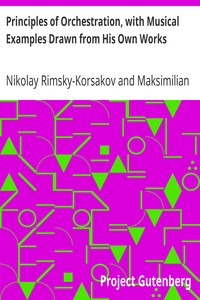Principles of Orchestration, with Musical Examples Drawn from His Own Works
"Principles of Orchestration, with Musical Examples Drawn from His Own Works" by Nikolay Rimsky-Korsakov is a treatise on orchestration written in the early 20th century. This work serves as a comprehensive examination of orchestral techniques, focusing on the principles of orchestrating music while providing insights from Rimsky-Korsakov’s own compositions to illustrate these concepts. The book targets students of music and composers seeking to understand the nuances and artistic considerations involved in orchestration.
At the start of the work, the authoress lays out the motivation behind his treatise, emphasizing the need to express orchestration as an essential part of music composition. The opening chapters detail the structure and capabilities of various orchestral groups, beginning with stringed instruments, and introduce fundamental concepts related to melody and its orchestral execution. Rimsky-Korsakov offers practical guidance on how to create effective combinations of instruments, explore their tonal qualities, and understand their expressive capacities. Through his meticulous analysis, he aims to provide a framework that enables musicians to master the art of orchestration while reminding them that creativity in this domain cannot be taught in formulaic terms. (This is an automatically generated summary.)
Read or download for free
| Reading Options | Url | Size | |||
|---|---|---|---|---|---|
| Read now! | https://www.gutenberg.org/ebooks/33900.html.images | 786 kB | |||
| EPUB3 (E-readers incl. Send-to-Kindle) | https://www.gutenberg.org/ebooks/33900.epub3.images | 237.1 MB | |||
| EPUB (older E-readers) | https://www.gutenberg.org/ebooks/33900.epub.images | 11.7 MB | |||
| EPUB (no images, older E-readers) | https://www.gutenberg.org/ebooks/33900.epub.noimages | 244 kB | |||
| Kindle | https://www.gutenberg.org/ebooks/33900.kf8.images | 32.0 MB | |||
| older Kindles | https://www.gutenberg.org/ebooks/33900.kindle.images | 31.8 MB | |||
| Plain Text UTF-8 | https://www.gutenberg.org/ebooks/33900.txt.utf-8 | 309 kB | |||
| Download HTML (zip) | https://www.gutenberg.org/cache/epub/33900/pg33900-h.zip | 258.3 MB | |||
| There may be more files related to this item. | |||||
Similar Books
About this eBook
| Author | Rimsky-Korsakov, Nikolay, 1844-1908 |
|---|---|
| Editor | Shteinberg, Maksimilian, 1883-1946 |
| Translator | Agate, Edward |
| Uniform Title | Osnovy orkestrovki. English |
| Title | Principles of Orchestration, with Musical Examples Drawn from His Own Works |
| Alternate Title | Основы оркестровки |
| Credits | Mark C. Orton, Linda Cantoni, Alex Guzman and the Online Distributed Proofreading Team |
| Reading Level | Reading ease score: 63.0 (8th & 9th grade). Neither easy nor difficult to read. |
| Language | English |
| LoC Class | MT: Music: Musical instruction and study, Composition |
| Subject | Instrumentation and orchestration |
| Category | Text |
| EBook-No. | 33900 |
| Release Date | Sep 29, 2010 |
| Most Recently Updated | Jul 31, 2021 |
| Copyright Status | Public domain in the USA. |
| Downloads | 3082 downloads in the last 30 days. |
| Project Gutenberg eBooks are always free! | |

